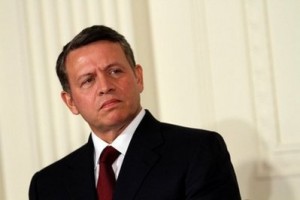 Jordan’s king urged his country’s Islamist opposition Sunday to take part in upcoming elections, despite their dissatisfaction with reforms.
Jordan’s king urged his country’s Islamist opposition Sunday to take part in upcoming elections, despite their dissatisfaction with reforms.
King Abdullah II’s appeal in a rare interview on Jordan TV was part of his attempt to engage with the Islamic Action Front, the political arm of the Muslim Brotherhood, Jordan’s main opposition. Islamists have made gains all over the region after Arab Spring uprisings and show increasing strength in Jordan.
“Our doors and hearts are open to everyone, including the Muslim Brotherhood and their party,” he said. “We call on all groups to take part in this reform process and participate in the legislative elections.”
Abdullah is concerned that the Brotherhood’s party will boycott elections, undermining his reform plan and igniting a violent uprising, like elsewhere in the Mideast. No date has been set, though the election is expected this year.
The main dispute is over a new election reform law. The state says it gives concessions to the opposition by allowing each citizen two separate ballots. One vote goes to local candidates and the other to a 17-seat national list, giving country-wide ideological alliances like the Islamists a better chance to compete with regional or family-based politicians.
Islamists argue that the law would still give a majority to pro-government loyalists, producing another docile legislature.
“The reforms are cosmetic,” said Islamist party leader Hamza Mansour. “They are slow, insufficient and do not meet our expectations.”
The Islamists, who boycotted the last two elections, are popular among many Jordanians, especially the low-income people, who benefit from Islamic charities that aid schools, banks and hospitals in areas outside the government’s reach.
Abdullah promised that in the future, the parliament would select the prime minister — a main opposition demand. He insisted that “reform is irreversible.”
He chided the opposition for seeing “only the empty half of the glass,” saying much has been achieved in the past months.
Jordan has weathered 18 months of street protests calling for a wider public say in politics, partially by curtailing the absolute powers of the king. The protests have been small and mild compared to mass uprisings elsewhere in the region.
Abdullah has changed 42 articles, or one-third of Jordan’s 60-year-old constitution, giving parliament a say in appointing Cabinets — a task which used to be his sole prerogative.
He also created an independent electoral commission to supervise the vote, taking over the role from the Interior Ministry.
Other moves included a political parties law that encourages a multiparty system and a municipalities law that allows Jordanians to govern their towns by electing mayors and city councils.
AP

Leave a Reply
You must be logged in to post a comment.